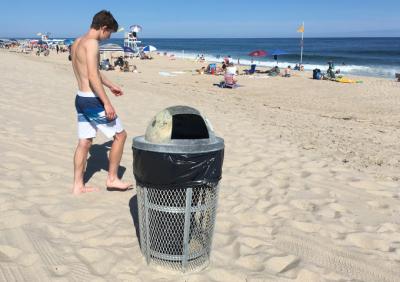A Call to Get Trash Bins Off East Hampton Beaches

The ongoing issue of litter on beaches was revisited on Monday when Dell Cullum, an East Hampton Town trustee, delivered a slide presentation to his colleagues that depicted overflowing receptacles on East Hampton Village beaches.
Three years ago, the trustees sought to have the garbage bins moved from the village’s five ocean beaches to the road ends or parking lots. That push met with a cool reception, with village officials expressing pride in the cleanliness of their beaches and their efforts to maintain them.
At the trustees’ prior meeting, on June 25, Mr. Cullum, who has organized beach cleanups and regularly collects litter of his own accord, issued lengthy remarks denouncing litterers and insisting that having garbage receptacles right on the beach only encourages them. The bins are overturned, he said, and seagulls and other wildlife tear into trash bags that are left nearby — some of which, he said, is household garbage — spreading refuse far and wide, including into the ocean.
“I’m not giving up on this,” Mr. Cullum said at the June 25 meeting, at times pounding the table for emphasis. “I don’t care how loud I have to scream about it. It has nothing to do with how well the village keeps the beach clean. Trash does not belong on the beach. Receptacles belong in the parking lots.”
On Monday, before Mr. Cullum could begin his slide show, Jim Grimes, a trustee, criticized his colleague’s June 25 actions. “Quite frankly, the behavior was embarrassing to most of the board members here,” he said, calling it “damaging to our relationship with the village.”
The litter “looks horrible,” Mr. Cullum answered, adding that he has been “dealing with this for eight years.” His suggestions — moving receptacles off the beach, and perhaps removing them altogether to encourage a carry-in, carry-out approach — are being ignored, he said, adding to his frustration. “I wasn’t trying to offend any person,” he said, just inveighing against the on-the-sand receptacles. The problem is overnight, between the last collection of the day and the first of the following day, he said. “I apologize for my behavior if it offended you and the rest of the board,” he told Mr. Grimes.
“I agreed with the concept of what you’re trying to accomplish,” Mr. Grimes said, “but your behavior at the last meeting. . . .” Noting that it is nearly mid-July, expecting the village to change its protocol now is unrealistic, he said. Mr. Cullum said he hoped that the village would change its trash-management practices by next year.
On Friday, Francis Bock, the trustees’ clerk, and his colleagues Brian Byrnes and Mr. Grimes met with Mayor Paul F. Rickenbach Jr., Newt Mott, who manages the village’s beaches, Rick Lawler of the village board, Rebecca Molinaro Hansen, the village administrator, and Scott Fithian, the superintendent of public works. “The village respects the position of the trustees, or any individual member,” Ms. Hansen said yesterday. “However, at this point in time the village does not feel there is a problem that needs to be addressed. If at some point in the future that changes and we want to change the way garbage is collected on the beaches . . . we’re certainly not opposed to it, but at this particular point in time we don’t see an issue with the way trash is being collected.”
On Monday, other trustees were empathetic but disagreed with Mr. Cullum’s assertions. “The village doesn’t create any of this litter,” said Bill Taylor. If it puts the cans on the beach, Mr. Cullum replied, it does.
Mr. Bock said he had visited Main Beach at around 6:45 on a recent evening, and saw a garbage bag on the sand next to a receptacle. Four hours later, it was still there. He said he lifted the receptacle’s lid, and it was empty. “That’s not going to stop people from leaving it” on the sand, he said.
Undeterred, Mr. Cullum asked that the trustees send a letter to the village asking that the bins be moved to the parking lots. “You can add as many as you want to the parking lot,” he said. “I just want them off the beach.”
Mr. Grimes said he was not in favor of the proposal, suggesting instead that the trustees meet with village officials in the off-season and explore alternatives. “I would be in favor of letting things cool down for a while,” Mr. Bock said, before revisiting the issue with the village. “If that’s not enough, I can’t support it either. But I’m more than happy to work on a program for next year.”
Rick Drew said that a carry-in, carry-out protocol should be explored, and that “reducing the amount of trash we create is really important” and a goal the trustees must embrace. “I just don’t know if we can do it in the middle of summer.”
Susan Vorpahl, however, said Mr. Cullum had her full support. “I’m encouraged by your passion,” she told him. “More people should follow that passion.” While it may be understandable that village officials took offense at his approach, “I still don’t think that’s reason to say we can’t do anything about it now.” Summer, she said, is precisely the time for action.
In other news from the meeting, Susan McGraw Keber told her colleagues that the pilot program in which Accabonac Harbor is sampled for mosquito larvae and data forwarded to the Suffolk County Department of Public Works’ division of vector control is having the desired result of reducing the use of methoprene, a larvicide. The county announced on Monday that it would not apply methoprene via helicopter this week. This is the third week in which larval samples have demonstrated no need to apply the larvicide, which critics say is harmful to non-target species including lobster and crabs. “We’re moving forward, little by little,” Ms. Keber said.
